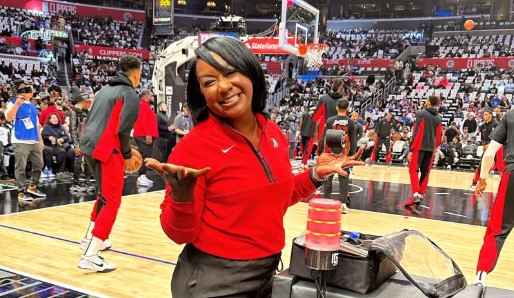Supporting the Stars: Athletic Trainers at the Heart of WNBA Excellence
 In the WNBA, with only 12 teams, there are few opportunities for the players and even fewer for the crucial role of the Athletic Trainer that keeps them healthy.
In the WNBA, with only 12 teams, there are few opportunities for the players and even fewer for the crucial role of the Athletic Trainer that keeps them healthy.
However, the league’s upcoming expansion with the Golden State Valkyries in 2025 and a Toronto team in 2026 promises to create new openings for aspiring ATs, further elevating the standard of care in women’s basketball.
Athletic Trainers in the WNBA are obviously essential to the teams' success. Some have transitioned from the WNBA to the NBA, bringing their expertise to the highest levels of professional sports.
 For instance, Jessica Cohen, who now works with the Milwaukee Bucks, and Courtney Watson, who serves as the Head Athletic Trainer for the Portland Trail Blazers, both began their careers in the WNBA.
For instance, Jessica Cohen, who now works with the Milwaukee Bucks, and Courtney Watson, who serves as the Head Athletic Trainer for the Portland Trail Blazers, both began their careers in the WNBA.
These moves highlight the high caliber of professionals working within the league.
And the opposite is true: some Athletic Trainers have chosen to move from men’s sports leagues into the WNBA, attracted by the opportunity to make a lasting impact in a growing area of professional sports.
One such individual is Ciara Burgi, who transitioned from the NFL to the WNBA, joining the Las Vegas Aces as Director of Health and Performance. Burgi noted the unique opportunities within the WNBA:
"There’s a lot of opportunity for creativity, for innovation... Women’s sport doesn’t have elite care in the United States right now, and there’s no reason for them to not have elite practitioners around them."
The role of Athletic Trainers in the WNBA has expanded significantly as the league has grown, both in terms of visibility and in resources allocated to player health.
Veteran trainers like Ann Crosby of the Chicago Sky and Chuck Barta of the Minnesota Lynx have witnessed this evolution firsthand. Crosby, who has been with the Sky since their inaugural season in 2006, and Barta, who has served as the Lynx’s Head Athletic Trainer for 18 seasons, remember the days when one person had to juggle multiple roles due to budget constraints.
Their dedication and experience have been instrumental in the development of their respective teams, contributing to the overall success and longevity of the athletes they care for.
As the WNBA continues to expand and evolve, the importance of Athletic Trainers cannot be overstated. These professionals are true heroes, working tirelessly behind the scenes to ensure that athletes can perform at their best, recover from injuries, and extend their careers.
Their expertise and dedication are vital to the success of the teams they serve, and as the league grows, their role will only become more crucial. The future of women’s basketball is bright, and Athletic Trainers will play a key role in shaping that future.
There is a seriously in-depth story on all the ATs in the WBNA with a lot of great photos and stories here! Check it out when you get a chance!
![HR Logo [Recovered]_Full Color Vertical-1](https://blog.healthyroster.com/hs-fs/hubfs/HR%20Logo%20%5BRecovered%5D_Full%20Color%20Vertical-1.png?width=199&height=178&name=HR%20Logo%20%5BRecovered%5D_Full%20Color%20Vertical-1.png)
 By
By


